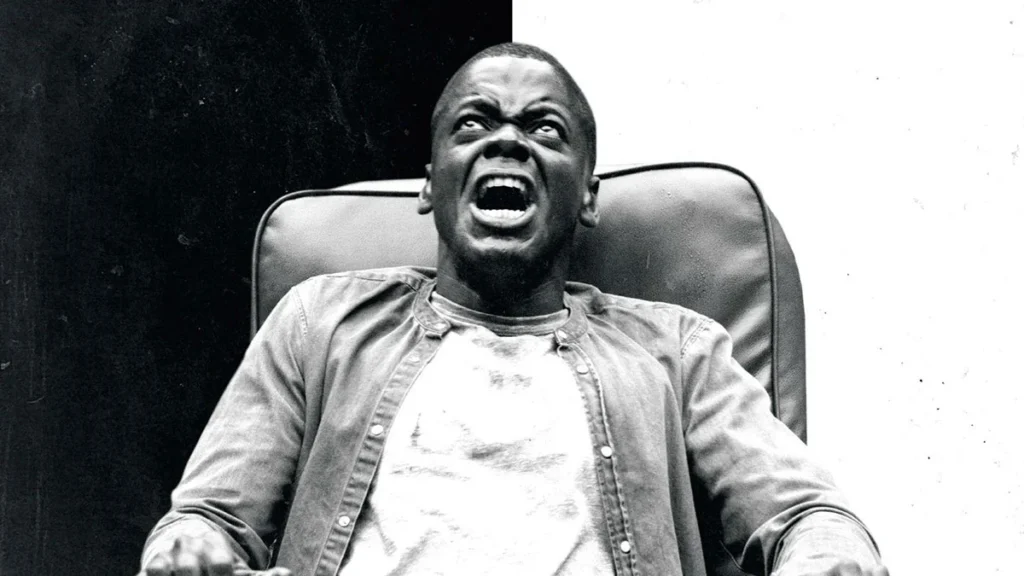If you’re a fan of the psychological thriller masterpiece Get Out, then you know how gripping and thought-provoking a well-crafted horror film can be. Jordan Peele’s directorial debut seamlessly blended scares, laughs, and biting social commentary to create a movie that left audiences reeling.
Once you’ve experienced the unnerving tension and shocking twists of Get Out, it’s hard not to crave more movies that deliver similar thrills. Luckily, there are plenty of other brilliant films that offer a comparable mix of horror, humor, and searing insights about race, class, and society.
So if you’re looking for more movies like Get Out to add to your watch list, we’ve got you covered. From psychological thrillers to satirical slashers, these 20 films are sure to get under your skin in the best way possible. Let’s dive in!
1. Us (2019)
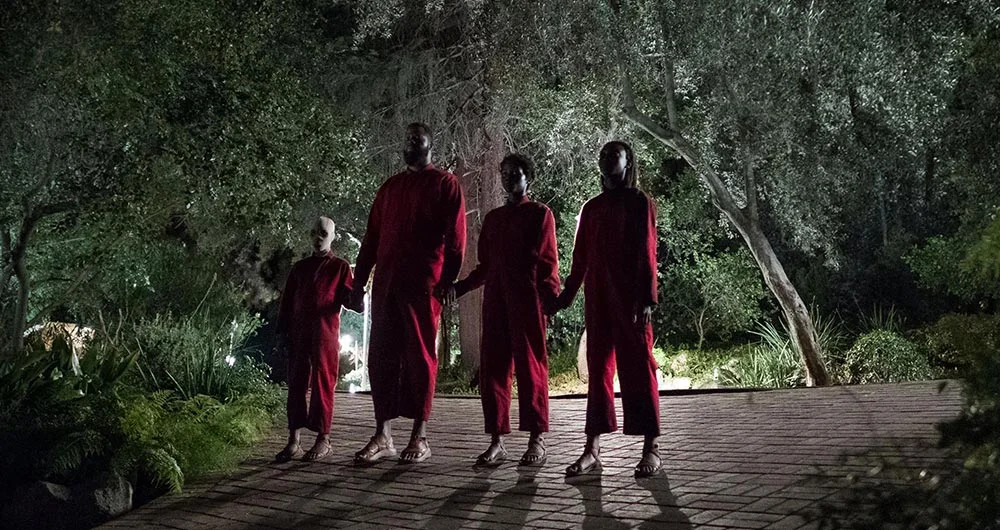
Who better to kick off this list than Jordan Peele himself? For his sophomore directing effort after Get Out, Peele crafted another instant classic with Us. This chilling home invasion thriller follows a family whose beach vacation turns into a nightmare when they’re confronted by a group of doppelgängers intent on killing them.
Like Get Out, Us is packed with symbolism, dark humor, and searing social commentary. Lupita Nyong’o delivers a tour-de-force dual performance as both the determined mother Adelaide and her raspy-voiced double, Red. From the perfectly executed horror beats to the jaw-dropping final twist, Us proves that Peele is far from a one-hit wonder.
2. The Stepford Wives (1975)

Based on Ira Levin’s satirical thriller novel, The Stepford Wives was one of the key inspirations for Get Out. The film follows Joanna Eberhart, a photographer who moves with her family to the idyllic suburb of Stepford, Connecticut. She’s disturbed to find that all the wives are impossibly perfect homemakers who are subservient to their husbands.
As Joanna investigates with her friend Bobbie, they uncover the chilling truth – the men of Stepford are killing their wives and replacing them with robotic duplicates. The Stepford Wives offers a darkly comedic take on gender roles and conformity that still resonates today. The 2004 remake with Nicole Kidman is also worth a watch.
3. Rosemary’s Baby (1968)

One of the most influential psychological horror films of all time, Rosemary’s Baby follows a young woman who becomes increasingly panicked about her mysterious pregnancy and the neighbors in her new apartment building. Mia Farrow’s harrowing lead performance anchors the film as Rosemary descends into paranoia.
Like Chris in Get Out, Rosemary finds herself trapped in an increasingly sinister situation where no one believes her. The film’s slow-burn pacing, unsettling atmosphere, and queasy themes of gaslighting and bodily autonomy clearly influenced Peele’s work. Rosemary’s Baby remains a disturbing classic from start to finish.
4. The Invitation (2015)

Karyn Kusama’s The Invitation is a masterful slow-burn thriller that expertly builds tension before exploding into violence. The film follows Will as he attends a dinner party hosted by his ex-wife Eden and her new husband David. As the night goes on, Will becomes increasingly suspicious of the couple’s motives for their reunion.
Like Get Out, The Invitation wrings terror from social awkwardness, as Will tries to figure out if his paranoia is justified or if grief is clouding his judgment. The simmering tension, shocking moments of violence, and knockout ending make this a must-watch for any psychological thriller fan.
5. Sorry to Bother You (2018)

For a more comedic riff on the evils lurking beneath the surface of polite society, check out Boots Riley’s dazzling debut Sorry to Bother You. Lakeith Stanfield stars as Cassius “Cash” Green, a struggling telemarketer who rockets up the corporate ladder when he starts using his “white voice.”
Sorry to Bother You veers in a much more surreal and satirical direction than Get Out, but it shares a cutting critique of how racism and capitalism are inextricably linked. With a stacked ensemble cast and an unpredictable plot that goes to some truly wild places, this absurdist comedy is one of the most original films in recent memory.
6. Candyman (2021)

Nia DaCosta’s Candyman serves as both a sequel to and a sly subversion of the 1992 original. This time around, the story follows Anthony McCoy, an artist who becomes obsessed with the urban legend of the Candyman and unknowingly sets off a terrifying chain of events.
Produced and co-written by Jordan Peele, Candyman shares a lot of DNA with Get Out, including its exploration of how racism and intergenerational trauma continue to haunt the present day. With gorgeous cinematography, gruesome kills, and a mesmerizing performance from Yahya Abdul-Mateen II, Candyman is a stunning example of socially conscious horror.
7. Midsommar (2019)
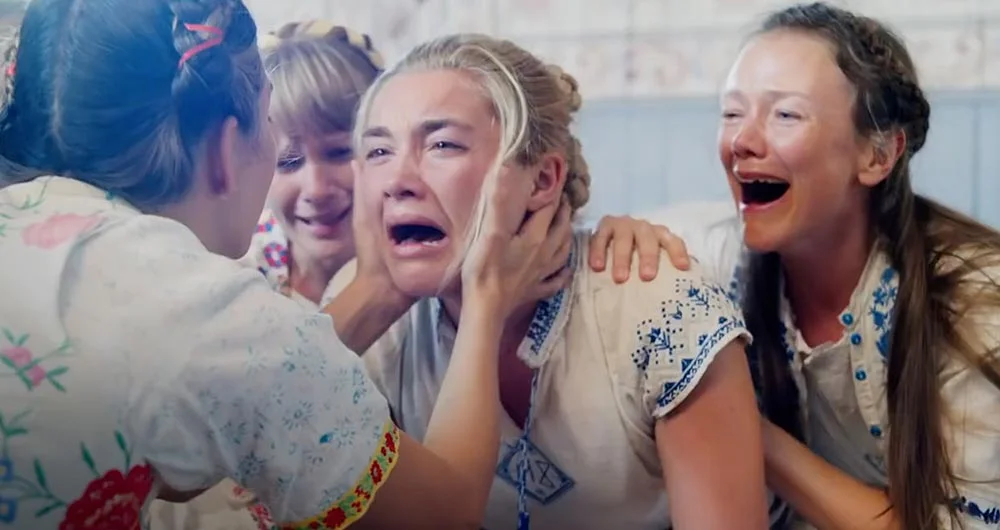
If the creepy cult vibes of Get Out appealed to you, then Ari Aster’s sun-soaked nightmare Midsommar is a must-see. The film follows Dani, who travels with her boyfriend and his friends to a remote Swedish village to attend a midsummer festival. But as the rituals grow increasingly disturbing, Dani realizes the true horror of her situation.
Like Get Out, Midsommar uses the framework of a romantic relationship to explore complex themes of grief, gaslighting, and cultural myopia. With its dread-soaked atmosphere, hallucinatory visuals, and cathartic final act, Midsommar is a trippy and unforgettable cinematic experience.
8. Parasite (2019)
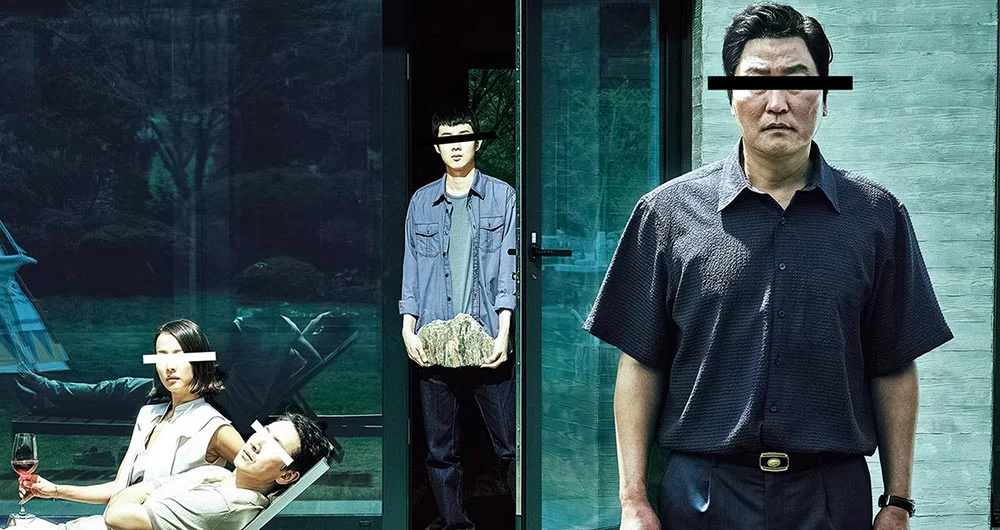
Bong Joon-ho’s Best Picture-winning thriller Parasite isn’t a horror movie, but it shares Get Out‘s cutting social commentary and deft tonal shifts. The film follows the impoverished Kim family as they cunningly infiltrate the wealthy Park household, posing as unrelated skilled workers.
As the two families become increasingly entangled, Parasite peels back the layers of class inequality and societal rot that underlie their dynamic. With its masterful cinematography, indelible performances, and explosive third act, Parasite is a darkly comic and devastating look at the horrors of capitalism.
9. The People Under the Stairs (1991)
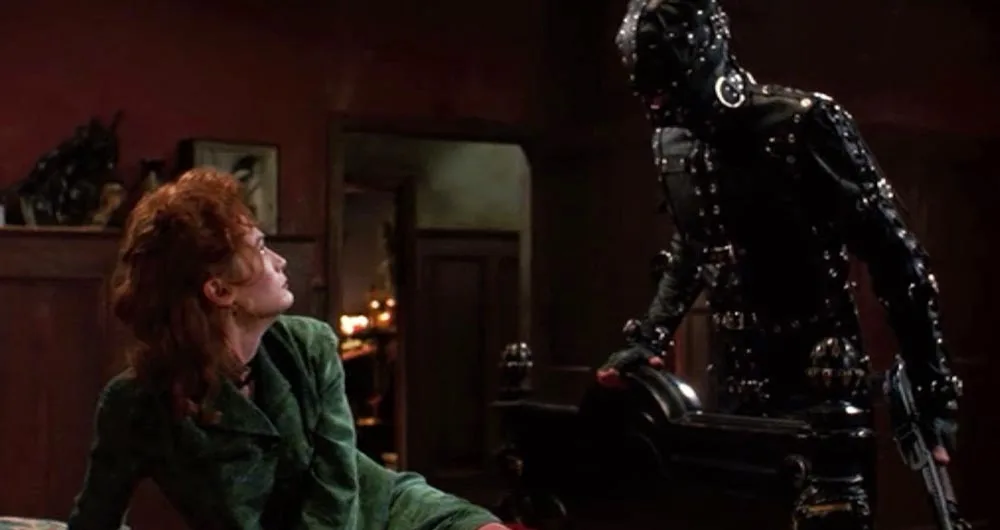
Wes Craven’s The People Under the Stairs offers a more overtly campy take on the evils lurking in suburbia. The film follows a young boy named Fool who breaks into his landlords’ house with two robbers, only to discover a disturbing labyrinth of horrors inside.
With its over-the-top villains, gonzo traps, and heavy-handed but effective social commentary, The People Under the Stairs feels like a pulpier riff on Get Out‘s themes. But Craven’s giddy blend of horror and satire makes this an underrated gem in the Master of Horror’s filmography.
10. Society (1989)
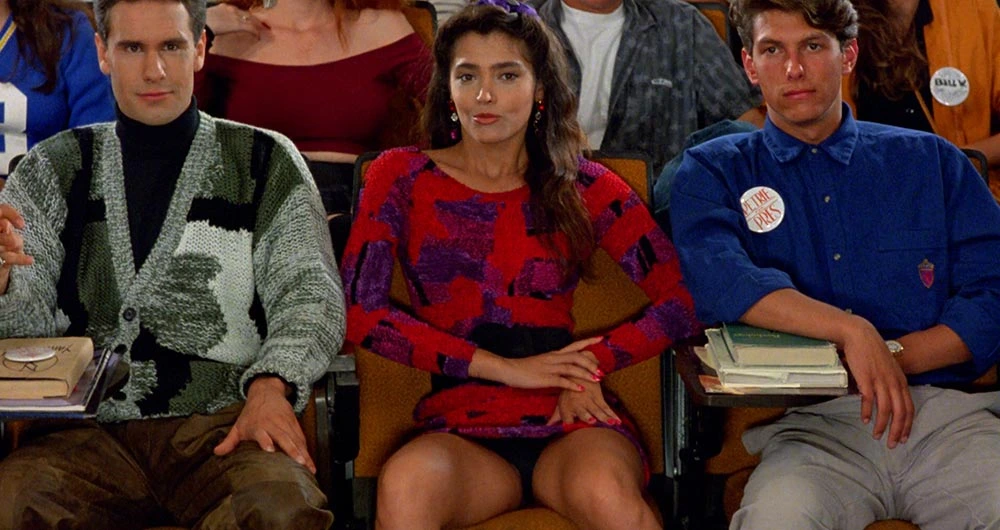
For a truly bizarre and grotesque take on upper-class depravity, look no further than Brian Yuzna’s body horror satire Society. The film follows Bill Whitney, a teenager who feels like he doesn’t fit in with his wealthy Beverly Hills family and begins to suspect that they’re hiding a dark secret.
To say more would spoil the wild places Society ultimately goes, but suffice to say, the film takes the idea of the rich feeding on the poor to nauseating extremes. With its icky practical effects and tongue-in-cheek humor, Society is a gooey, gory, and weirdly fun class critique.
11. Funny Games (1997)
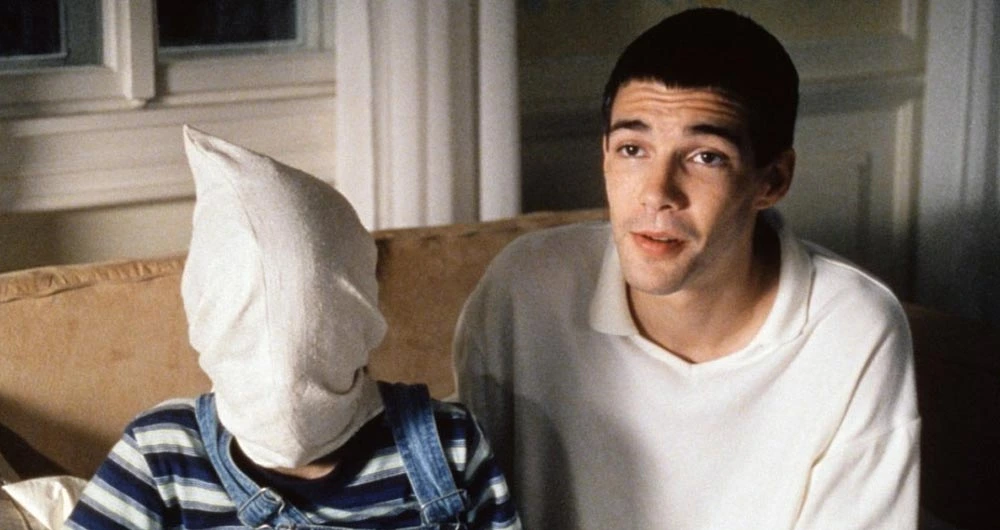
Michael Haneke’s Funny Games is the furthest thing from a comedy – it’s a relentlessly bleak and brutal home invasion thriller that implicates the audience in its on-screen violence. The film follows a wealthy family who are terrorized by two young men who subject them to a series of sadistic “games.”
Like Get Out, Funny Games is a searing critique of privilege and complacency, forcing the viewer to confront their own voyeuristic impulses. With its fourth-wall-breaking moments and uncompromising nihilism, Funny Games is a challenging but undeniably powerful viewing experience. Haneke later remade the film shot-for-shot in English with Naomi Watts and Tim Roth.
12. Scream (1996)

Wes Craven’s meta-horror classic Scream might not seem like an obvious comparison to Get Out at first glance. But beneath its ironic, self-referential surface lies a sharp commentary on the way society consumes and perpetuates violence, especially against women.
Like Get Out, Scream is a film that rewards close analysis, from its deconstruction of horror tropes to its sly critiques of media influence. With its iconic masked killer, memorable young cast, and endlessly quotable script, Scream remains the gold standard for slasher satire.
13. Under the Shadow (2016)

Set in Tehran during the Iran-Iraq War, Babak Anvari’s chilling debut Under the Shadow follows Shideh, a former medical student barred from continuing her studies due to her political activism. When her husband is drafted, Shideh and her young daughter Dorsa find themselves besieged by both falling bombs and malevolent spirits.
Like Get Out, Under the Shadow uses the supernatural to explore very real social and political anxieties, from the oppression of women under fundamentalist rule to the trauma of war. With its slow-burn pacing, creepy imagery, and powerful lead performance from Narges Rashidi, Under the Shadow is an underseen gem of international horror.
14. The Cabin in the Woods (2011)

Drew Goddard’s The Cabin in the Woods is another self-aware meta-horror comedy that deconstructs and subverts the genre’s tropes at every turn. The film follows a group of college students who visit a remote cabin for a weekend getaway, only to find themselves trapped in a high-tech underground facility where they’re manipulated into playing out horror movie clichés.
Like Get Out, The Cabin in the Woods is a film that rewards multiple viewings, as its intricate mythology and clever foreshadowing become more apparent over time. With its all-star cast, razor-sharp wit, and bonkers third act, The Cabin in the Woods is a giddily entertaining ride that also has something to say about the way we tell stories.
15. Night of the Living Dead (1968)

George A. Romero’s landmark zombie film Night of the Living Dead might not seem to have much in common with Get Out at first glance. But both films use the horror genre to offer searing commentaries on race in America, and both feature Black male protagonists who face threats from both the supernatural and the human.
In Night of the Living Dead, Ben (Duane Jones) finds himself trapped in a farmhouse besieged by the undead, but the greatest threat may come from the white family hiding out with him. With its bleak ending and matter-of-fact presentation of racial tensions, Night of the Living Dead was way ahead of its time, and its influence can still be felt in socially conscious horror today.
16. Attack the Block (2011)

Before he was Finn in the new Star Wars films, John Boyega made his screen debut in Joe Cornish’s sci-fi horror comedy Attack the Block. The film follows a teenage street gang in South London who must defend their block from an invasion of vicious alien creatures.
Like Get Out, Attack the Block offers a refreshing perspective on a well-worn genre, centering Black characters who are often marginalized or stereotyped in horror films. With its witty script, kinetic action, and surprising social commentary, Attack the Block is a fast-paced and fun genre mash-up with a lot on its mind.
17. The Wicker Man (1973)

Robin Hardy’s cult classic The Wicker Man follows a devoutly Christian police sergeant named Howie (Edward Woodward) who travels to a remote Scottish island to investigate the disappearance of a young girl. But Howie soon discovers that the island’s inhabitants practice a form of Celtic paganism, and he becomes increasingly disturbed by their rituals and beliefs.
Like Get Out, The Wicker Man is a slow-burn horror film that builds to a shocking and unforgettable climax. And like Get Out, it offers a sly commentary on the dangers of insularity and the way society can manipulate individuals for its own ends. With its eerie folk soundtrack, lush cinematography, and career-best performance from Christopher Lee, The Wicker Man is a strange and unsettling masterpiece.
18. It Follows (2014)

David Robert Mitchell’s It Follows is a modern horror classic that takes the idea of a sexually transmitted curse to its logical extreme. The film follows Jay, a teenage girl who sleeps with her new boyfriend, only to discover that she’s been infected with a supernatural entity that will pursue her relentlessly until she passes it on to someone else.
Like Get Out, It Follows is a film that’s rich with subtext, from its commentary on the dangers of sexual promiscuity to its sly nods to classic horror tropes. With its dreamy, synth-heavy score, fluid camerawork, and terrifying central conceit, It Follows is a masterful exercise in slow-burn horror that lingers long after the credits roll.
19. The Babadook (2014)

Jennifer Kent’s The Babadook is another modern horror classic that uses the supernatural to explore very real human fears and traumas. The film follows Amelia, a single mother struggling to raise her troubled six-year-old son Samuel after the death of her husband. When a mysterious children’s book about a monster called the Babadook appears in their home, Samuel becomes convinced that the creature is real and coming to get them.
Like Get Out, The Babadook is a film that works on multiple levels, from its visceral scares to its poignant exploration of grief and motherhood. With its striking expressionistic visuals, gut-wrenching performances, and haunting ending, The Babadook is a deeply unsettling and emotionally resonant horror film that showcases the power of the genre to explore complex themes.
20. The Shining (1980)

No list of mind-bending horror films would be complete without Stanley Kubrick’s adaptation of Stephen King’s The Shining. The film follows Jack Torrance, a writer who takes a job as the winter caretaker of the isolated Overlook Hotel, bringing his wife Wendy and young son Danny along with him. But as the harsh winter sets in, Jack begins to unravel, and the dark secrets of the hotel’s past come back to haunt the family.
Like Get Out, The Shining is a film that rewards close analysis and multiple viewings, from its intricate production design to its ambiguous ending. With its iconic performances, indelible imagery, and labyrinthine themes, The Shining remains a towering achievement in psychological horror that continues to inspire and unsettle audiences to this day.
So there you have it – 20 mind-bending movies like Get Out that are sure to keep you up at night. Whether you’re in the mood for a slow-burn thriller, a gory satire, or a supernatural nightmare, these films offer a similar blend of scares, laughs, and social commentary that made Jordan Peele’s debut such a sensation.
So the next time you’re in the mood for a movie that will make you laugh, scream, and think, give one of these Get Out-esque gems a try. Just be sure to watch with the lights on – and maybe with a friend or two to keep you company. Happy viewing!
